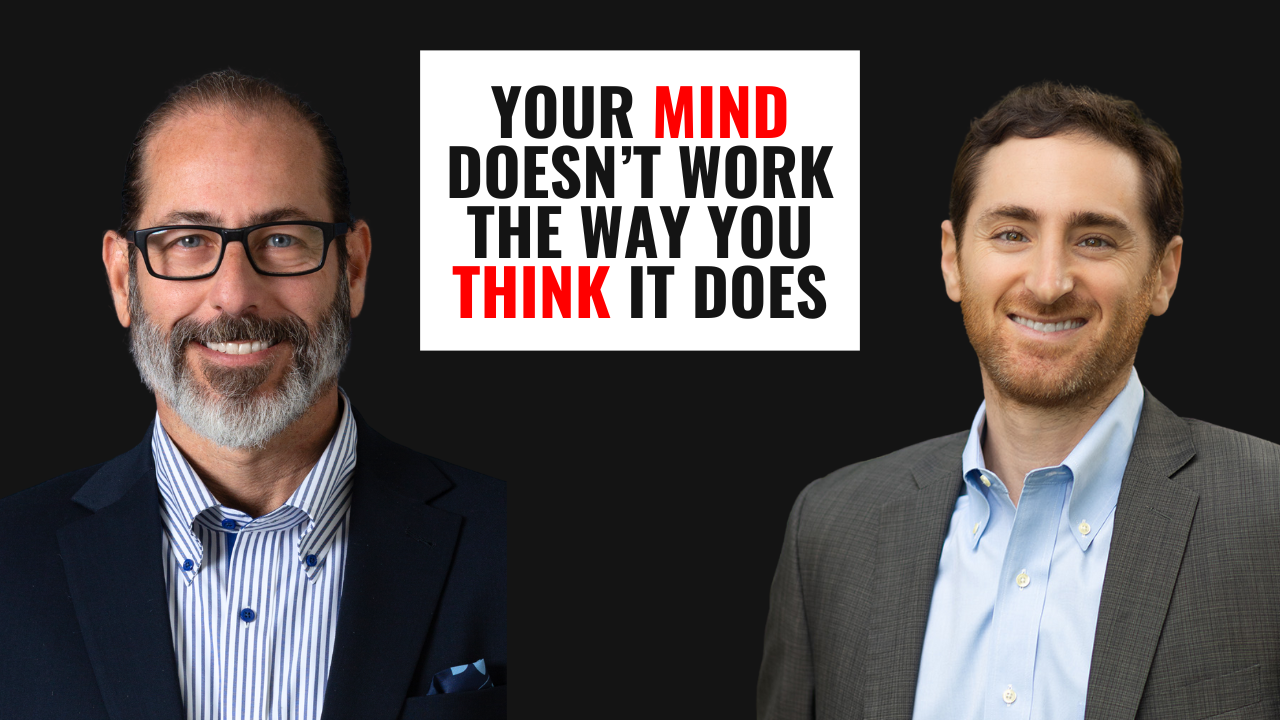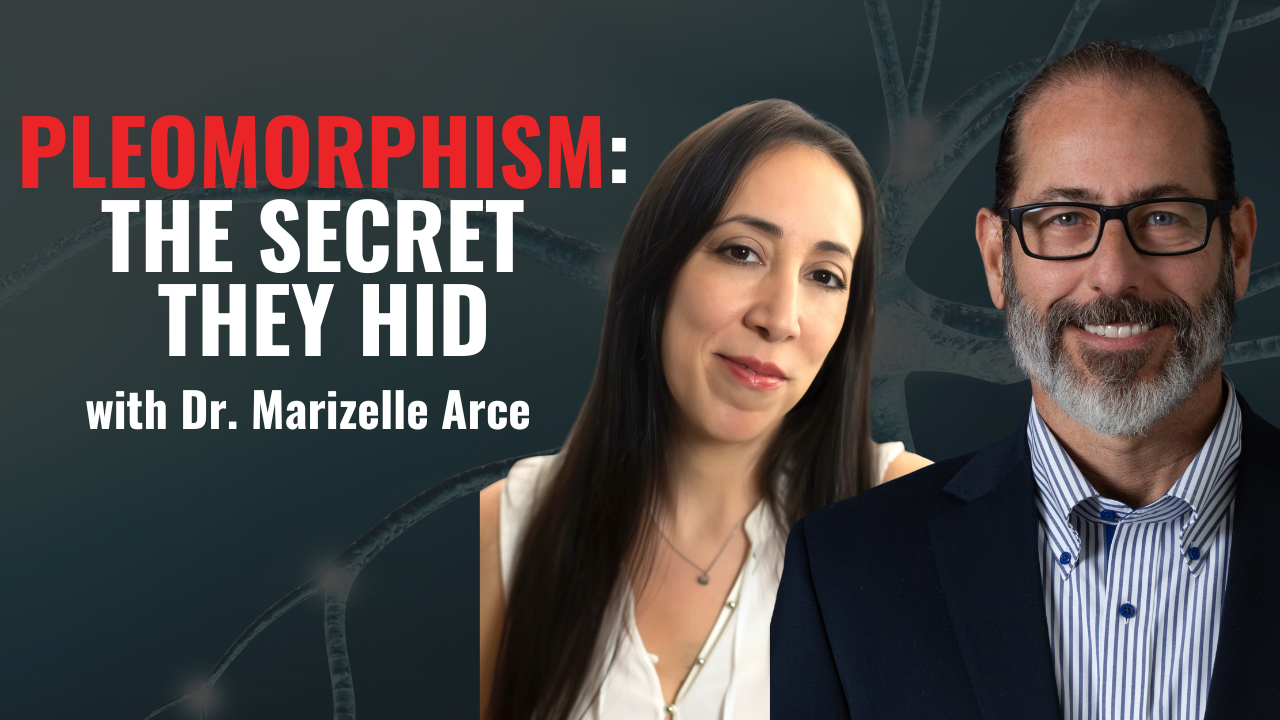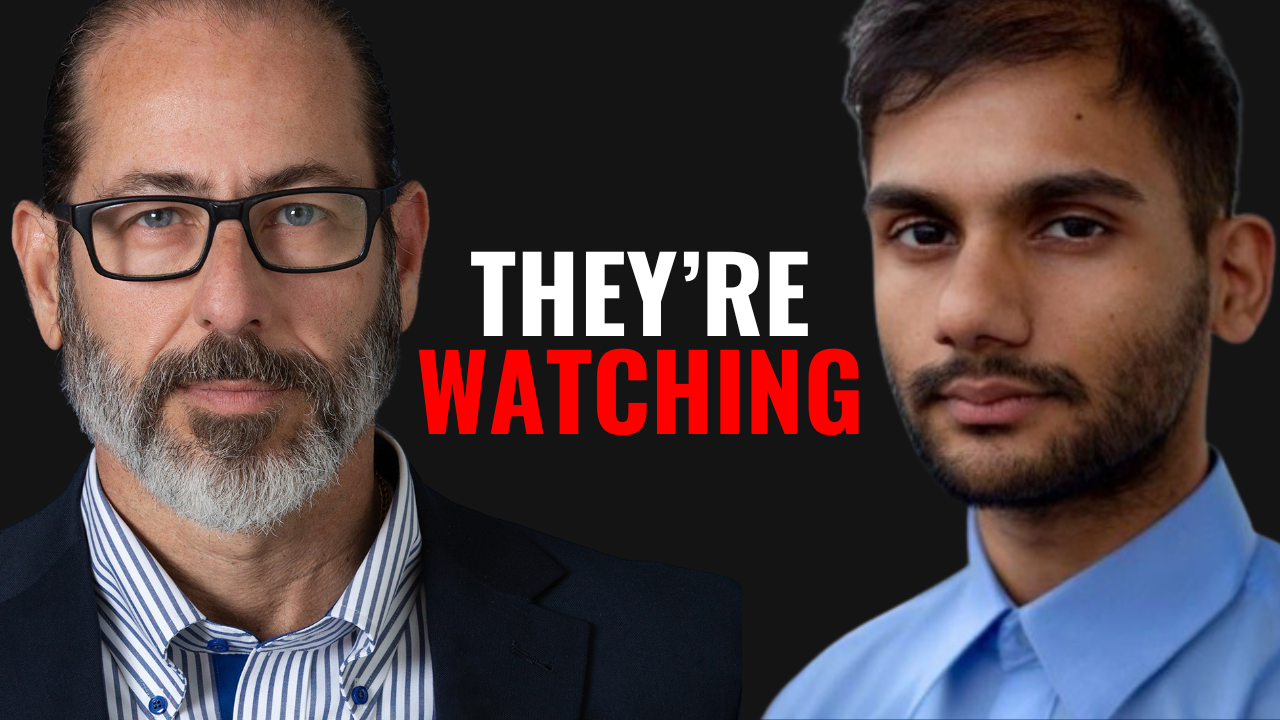The Consciousness Coverup with Mark Gober
Nov 19, 2025
You’ve been lied to about consciousness.
The dominant narrative — that you’re just a body, that thoughts are electrical sparks in a slab of meat, and that death is the end — is breaking down.
And it’s not just outdated. It’s a lie.
Science, media, and academia have long insisted that consciousness is a byproduct of brain chemistry. That your sense of self, your memories, emotions, even your free will, are just side effects of neural activity.
But mounting evidence says otherwise.
And the real reason this truth has been hidden? Because if you knew who you really were… you’d stop playing the role they wrote for you.
In this episode of The True Health Report, I’m joined by Mark Gober — a leading voice in the consciousness field and author of An End to Upside Down Thinking.
Together, we explore:
- How the U.S. government secretly used “psychic spies” in classified operations
- What near-death experiences teach us about realities beyond the five senses
- Why perception may actually shape what happens around you
- Mark’s framework for understanding reality beyond material illusion
- How reclaiming this knowledge can unlock deeper health, sovereignty, and self-mastery
Listen in then join the conversation!
Timestamps
00:00 - What they’re not telling you about consciousness
02:12 - Why the materialist mindset is fundamentally flawed
07:28 - When Mark realized what mainstream science was covering up
12:21 - Discerning the difference between facts and falsehood in a world full of deceit
18:59 - How Mark amassed his remarkable research for Upside Down Thinking
23:06 - encouraging curiosity in the cracks of materialist science
30:37 - How your own mind can reshape reality (and even save your own life)
43:41 - When the U.S. government tapped into humanity’s “psychic potential”
44:49 - Refuting the misleading models of reality taught by mainstream science
51:34 - Understanding the wheelwork of reality (they’re desperately trying to hide)
Mentioned in this episode:
Mark Gober’s Book: An End to Upside Down Thinking
Mark Gober’s Website: https://www.markgober.com/
Mark Gober’s Podcast: Where Is My Mind
Transcript:
Declassified CIA documents describe the use of psychic spying for national security — what they called remote viewing. Former U.S. President Jimmy Carter even confirmed that psychic spies helped locate a downed Russian bomber lost in an African jungle when radar couldn’t find it. This is The True Health Report, where critical appraisal fuels true freedom.
Hello everyone, and welcome to The True Health Report. I'm your host, Dr. Andrew Kaufman. Today I'm speaking with a guest on a very interesting topic: consciousness. In this episode, we challenge the assumptions of materialism in science and look at experimental evidence that sheds light on the mind–body problem.
Our guest, Mark Gober, is a remarkable researcher and the author of at least seven books in the Upside Down series. I first heard of him when he reached out to me about editing some chapters on medical science in his book An End to Upside Down Medicine. We've been in a discussion group together for a while, and I noticed he was informed on a wide range of topics. Eventually I read what I believe was his first book, An End to Upside Down Thinking, and we’re going to explore his ideas about consciousness today.
Mark has a fascinating background: Princeton psychology major, then finance and investment banking, before realizing something deeper was going on in science and society. Mark, welcome. Thank you so much for having me. It’s a pleasure to finally do this. I should have reached out sooner, given the breadth of your work.
So Mark, how does someone go from a prestigious investment banking career — with all the rewards society promises — to risking your reputation by taking a truthful stance on these topics? I wasn’t aware of any of this until 2016. That’s the first reason: I simply didn’t know. They didn’t teach you this at Princeton? No. The sad thing is that the more I reflect, the more I realize I stressed over getting good grades in things I no longer think are true.
But at the time, I had no idea. By 2016 I had hit a wall in many aspects of life. Even a few years earlier, I had begun to notice that none of the things I was achieving were bringing lasting satisfaction. I believed life was random and meaningless — that death was the end of consciousness, that spiritual phenomena weren’t real, and anyone who believed in them was just afraid of the finality of death. I wasn’t going to do that.
I trusted “what science said,” and science insisted there was no higher intelligence — everything was random and meaningless. If I may interrupt — that philosophy of materialism is the paradigm we live in. In that worldview — no meaning, no purpose, just a “meat suit” that disappears at death — what do you think are the cultural and philosophical consequences? They’re huge.
First, morality: if you don’t believe in an organizing intelligence behind reality, then why act ethically beyond survival of the fittest? That’s where the Darwinian model becomes dominant — do whatever you need to succeed; there are no spiritual consequences. Second, if death is the absolute end, it creates fear — and a frantic rush to cram everything into one lifetime. That’s very different from believing consciousness continues beyond the body. Without that, nihilism creeps in. For some people it stays in the background; for me it became stronger. I started asking myself, “What’s the point of any of this?”
Fascinating. What you’re describing leads directly to moral relativism — justifying whatever serves your advantage. And psychologically, it creates exactly what I’ve seen in psychiatry: an existential crisis. In my current work on natural healing, this is one of the deepest problems affecting mental and physical health. These are major cultural issues. And ultimately, as you said, it leads to nihilism — which eventually produces a decadent society. It’s very challenging to live that way. Even hedonism becomes empty, because it’s temporary and then you die. I struggled with both successes and failures under that worldview. And even though the worldview was painful, I wasn’t going to change it just to comfort myself. I wanted what was true, and I believed science supported materialism.
Which might explain why many mainstream people embrace religion — it offers refuge from the dark idea of “nothingness.” Perhaps for some. But for me, the shift wasn’t about comfort. I had to be dragged, kicking and screaming, away from materialism. I was forced to change because of what I encountered. So what brought on that confrontation? It was a mix of personal and professional struggles, and the realization that materialism couldn’t help me make sense of them. Then I encountered phenomena I’d never heard of.
In 2016 I was listening to podcasts — Tim Ferris talking about sensory deprivation tanks and psychedelics. That led me to alternative health shows like Extreme Health Radio. One day they had a guest named Laura Powers, who spoke about psychic abilities she uses with clients. She talked about angels and interdimensional beings. What caught my attention was that the hosts — who seemed reasonably discerning — took her seriously. They weren’t dismissing her. Something in me said, “Maybe there’s something I’m missing.” I felt cognitive dissonance, but I stayed. Most people would have switched to a different podcast.
You must have heard mentions of psychics earlier in life — so something was different now. Do you think this was connected to a developmental or existential crisis around your career not delivering fulfillment? Possibly. I might have been ripe. But something about that episode grabbed me enough to listen to Laura’s own podcast. Her episodes were short, and she interviewed people from all over the spiritual world — some scientific, some experiential.
After hearing case after case, I couldn’t explain the similarities. They weren’t colluding; they didn’t know each other. I didn’t think they were lying. So I wondered if they were all tapping into something real. That pushed me to read books and scientific papers. I discovered the University of Virginia’s Division of Perceptual Studies, which researches near-death experiences.
The Institute of Noetic Sciences studies psychic abilities and energy healing. Princeton had a lab for almost 30 years researching psychic phenomena — run by the former dean of engineering — and I had no idea it existed when I was an undergrad. And then I found the CIA’s declassified documents on remote viewing. I was blown away. I thought I was well educated, but I hadn’t heard any of this.
So suddenly you’re confronted with evidence from reputable academic institutions and government agencies — not carnival psychics.
Exactly. Anecdotes are one thing, but this was institutional research. Fraud exists in every field, but that doesn’t invalidate an entire domain. And you’re right — Duke University had a parapsychology program as well, run by J.B. Rhine.
Where did you develop your discernment for evaluating new claims? You mentioned you applied some validity testing when listening to Laura. This is something people rely on me to do — so where did you learn it?
A lot of it may be subconscious. Some of it came from academic training, but much came from strategy consulting in Silicon Valley. I worked with companies developing complex technologies. I constantly had to enter new industries, learn them quickly, understand the technology, and form judgments. So I became used to evaluating unfamiliar situations. I look for consistency — internal validity. And there’s also an intuitive piece — a sense of genuineness that’s hard to articulate.
That’s intuition — combining rational analysis with inner knowing. And that mirrors this entire conversation: relying on consciousness rather than just mechanical brain computation. Exactly.
When someone presents a series of claims, I try to see what worldview could accommodate them. If they seem genuine, then I ask how my worldview would need to shift to make sense of their claims. It becomes like a puzzle — taking pieces out and putting new ones in. That’s crucial — because many researchers uncover truth in one area but never integrate it with other fields.
Early in your writing you made this mistake too, which you’ve acknowledged — and so have I, and so has Tom Cowan. Growth requires re-evaluating previous assumptions. Absolutely. In my early books I took mainstream beliefs for granted without investigating them. For example, I referenced germ theory as fact. Now I question it. Same with general relativity. This is a normal part of learning. And people need to evaluate claims individually. Don’t throw out the baby with the bathwater because someone is wrong about one thing. Exactly.
And conversely, you can dislike someone and still agree with something they say. It seems some people today don’t believe that’s possible. But of course it is — two people will never agree on everything. And disagreements often arise simply because one person hasn't researched the subject. And that’s what I encountered debating germ theory — people arguing from assumptions, not from reading the papers.
So where did your research lead you? And what were the early discoveries that made you realize the paradigm was wrong?
My research in 2016 was entirely personal. I understood the implications: if even a fraction of what I encountered was valid, I had to rethink the metaphysics of reality. Was life meaningless, or was there something more? So you decided to start small? Right. I was obsessed. I bought every book that seemed relevant. I spent all my free time studying for about a year. I shared findings with friends; some were skeptical, others intrigued.
By summer 2017 I decided to summarize the findings in a book — An End to Upside Down Thinking, published in 2018. The book focuses on the question: does the brain create consciousness? I didn’t start there, but I realized that all these phenomena — near-death experiences, reincarnation memories, telepathy, precognition — all relate to that central question. If even one phenomenon contradicts materialism, the entire model must be revised or discarded.
So this wasn’t a plan to write books; it was your own spiritual journey. Exactly. I never planned to write publicly. I was on a solid career path — I became a partner at my firm in 2018. But my priorities shifted dramatically. Each book reflects my personal evolution. Public speaking emerged only because I wanted to share the information that had transformed me. We’re glad you did — not many people can synthesize this material the way you have. Can you share some of the early experiments that caught your friends’ attention?
I like to start where mainstream and alternative perspectives agree. One example is quantum mechanics — especially entanglement. Two distant particles can affect each other instantaneously, suggesting deep interconnectedness. Dean Radin’s book Entangled Minds explores how this might relate to consciousness.
Another foundational topic is the hard problem of consciousness. Consciousness is undeniable — we’re all experiencing right now — but it’s nonphysical. The brain is physical. How does the nonphysical emerge from the physical? Neuroscience has never explained this. We only observe correlations — neural correlates of consciousness — but correlation does not imply causation. Exactly — if someone gets hit in the head and loses consciousness, that’s a correlation. But it doesn’t explain how consciousness arises from matter. Right.
Materialists claim consciousness is an epiphenomenon of the brain — but it’s never been observed. And if consciousness ends when the brain shuts down, then death is the end. That shapes everything — including the idea that AI will “become conscious.” If consciousness doesn’t emerge from circuitry, then that fear is misplaced. I agree — AI is sophisticated computation, not consciousness.
And there’s evidence suggesting the brain is more like a filter or receiver of consciousness, not a producer. Cases of organ transplant recipients who adopt traits of their donors — musical abilities, food preferences, even personality — raise questions about where “memory” resides. Those anomalies force us to revise the model. Even one black swan disproves “all swans are white.” Exactly.
Let’s shift to the random number generator experiments — these fascinate me. These experiments, done at Princeton and elsewhere, use machines that randomly produce ones and zeros. Over time, the output should be 50/50. Researchers ask participants to mentally influence the machine — “produce more ones.” Consistently, people shift the output slightly but statistically significantly. When they overthink it, performance drops; when they relax, performance improves.
Another experiment is the Global Consciousness Project — random number generators around the world monitored during major emotional events. During events like 9/11 or Princess Diana’s death, the machines behave nonrandomly. The implication: consciousness can influence physical systems. This suggests reality is malleable.Yes — especially collective consciousness.
This relates to the Maharishi Effect, where groups meditating with peaceful intention appear to reduce violence in surrounding areas. Which means people in the truth movement may have more power than they realize. Exactly. Changing individual consciousness may have measurable effects in the world. And prayer, intention, meditation — these might all have tangible influence. They may. But funding for these topics is scarce. Journals often reject studies not because of methodological flaws but because the results contradict mainstream beliefs. We’ve seen that in many fields. Let’s connect this to health.
You mentioned Masaru Emoto’s experiments — consciousness affecting water. My kids even felt changes when directing gratitude toward the water in their bodies. What evidence have you found that consciousness affects physical health? One famous example is Anita Moorjani. She had tumors throughout her body, entered a coma, had a profound near-death experience, and returned with major shifts in her understanding. When she revived, her tumors disappeared rapidly — without medical intervention sufficient to explain it.
Consciousness appeared to play a role. Mainstream medicine calls that a “spontaneous remission” — which just means “we don’t know.” Exactly. But near-death experiences often transform people so profoundly that their health shifts too. And many doctors begin their medical careers after similar personal experiences — close brushes with death or extreme illness. Yes. Yet near-death experiences can’t be dismissed as “brain hallucinations,” because brains near death often show little to no measurable activity, and yet people report accurate perceptions from outside their bodies — veridical out-of-body experiences. These are validated by witnesses.
Which proves it’s not hallucination — because hallucinations don’t reveal real-time information from outside one’s sensory field. Right. Which connects directly to remote viewing — perceiving distant locations without sensory input. Exactly. And the CIA invested millions in it. Carter confirmed they used psychic spies. Stanford ran a dedicated program. The Monroe Institute was also born from intelligence research.
Given all this, what are your conclusions about the nature of reality and consciousness? I’m more interested in falsifying the existing model than claiming I know the full alternative. But materialism rests on an unprovable assumption: that a world existed outside consciousness before consciousness ever arose. You’d need consciousness to verify a world without consciousness — impossible. It’s a leap of faith. So materialism is circular reasoning. Yes. A house of cards.
So how would you describe reality? I like Bernardo Kastrup’s analogy: reality is an infinite stream of water, with water representing consciousness. Each individual is a whirlpool — appearing separate, but made of the same substance and connected at a deeper level. Consciousness is fundamental. Physical reality is a modulation of consciousness, not the other way around. Occam’s razor actually favors idealism — consciousness first — because consciousness is the only thing we can truly verify. Everything else is inference.
Could it be that there is only consciousness? It’s the only thing we directly experience. Even physical objects appear only as experiences in consciousness. And physics shows matter is mostly empty space — or perhaps even that “empty space” is a construct of perception. Max Planck said, “I regard consciousness as fundamental. I regard matter as derivative from consciousness.” Exactly. What about after we die? Near-death experiencers feel they’ve glimpsed the deeper nature of reality — though they often say it’s ineffable.
Critics argue that NDEs aren't actual death, but shared-death experiences — where a healthy person shares the dying person’s experience — strengthen the case. And we have mediumship, hypnosis, past-life memories, and especially children who recall past lives with verifiable details and even birthmarks matching injuries of the previous person. Yes. The University of Virginia has over 2,500 such cases. The physical correlations are especially striking.
The cumulative body of evidence is overwhelming. Materialism collapses under it. Exactly. And there’s no compelling case supporting materialism to begin with. Mark, thank you for shedding light on these topics.
What’s the best way for people to find your work? My website, markgober.com. All seven books are on Amazon in print, Kindle, and Audible — I narrated all of them. I also have an eight-episode podcast series called Where Is My Mind? which interviews NDE survivors and researchers. Start at Episode One and go sequentially. I’m flying tomorrow — I’ll be alternating between your books and podcast. I encourage everyone listening to explore these resources. Mark, I’d love to have you back to discuss another book. Take care.
Thank you, Andy. I appreciate all your work — I’ve learned so much from you. And thank you all for listening.
Even if you’re living clean, you’re still exposed to toxins — from off-gassing furniture and plastics to synthetic fibers, personal care products, and medical imaging. Especially fat-soluble chemicals — they settle deep in your tissues and don’t leave with basic detoxes. That’s why I created the Ultimate Detox Protocol, a free 30-day roadmap for a seriousnature-based detox. Choose the diet that fits your needs, support your elimination pathways, and lower the toxin load that’s been holding you back. Many people report major improvements in energy, focus, digestion, and long-standing symptoms they thought they’d live with forever. I can’t share the full scope of results publicly — it would get this video taken down — but it’s incredibly powerful. Download it for free at the link in the show notes. Your health is your responsibility, and this is the best place to start. Thanks for listening, and I’ll see you in the next True Health Report.
Stay connected with news and updates!
Join our mailing list to receive the latest news and updates from Dr. Andrew Kaufman.




